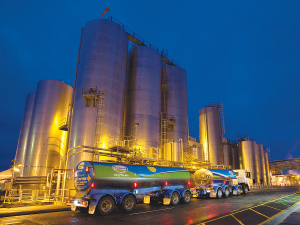Another Windfall for Fonterra Farmers, Unit Holders
Fonterra farmer shareholders and unit holders are in line for another payment in April.
 Dairy Workers Union general secretary Chris Flatt fears some factory workers may be lost to the industry because of their anti-vaccination stance.
Dairy Workers Union general secretary Chris Flatt fears some factory workers may be lost to the industry because of their anti-vaccination stance.
The dairy industry is facing the prospect of losing some highly skilled staff because they are not fully vaccinated.
Dairy companies around the country are individually going through a risk assessment process and consulting staff on whether or not to mandate vaccinations for staff.
Dairy Workers Union national secretary Chris Flatt told Dairy News he fears that some workers may be lost to the industry because of their anti-vaccination stance.
The union represents 8,500 workers in the industry and Flatt says the key focus of the union is about people's health and safety when they go to work.
He says, like the rest of society, there are conflicting views within the dairy industry workforce on the issues of vaccination.
"What we have heard is that the majority of our members support vaccination. They want to be safe at work and have received double vaccination. But there are those within our union, like in wider society, who don't agree with that and we are trying to support them as well," he says.
Flatt says his union has been heavily involved in the consultation processes on risk assessments with those companies they have collective agreements with. There is only one they don't have an agreement with. He says the process has been fair and they feel thir concerns have been listened to.
He notes that while they may not agree with everything, they accept the fact that companies have the right in law to put in place a vaccination mandate for their staff.
The union has the challenging task of supporting both those who are vaccinated and those who are not. In the case of the latter, Flatt says they are working with these people to see if they can get a vaccination or possibly an exemption, which some companies are offering in certain circumstances - particularly on medical grounds.
"But we also have members who tell us they want to turn up to work and be safe at work and not be around, potentially, those that could spread the virus," he says.
Flatt says there are some tough conversations still to be had before companies make a final decision on how to manage their respective risks around the highly-transmissable Omicron variant. Talks are ongoing in this respect and while it appears that most will mandate vaccinations, Dairy News is aware that at least one company will not,k because of low vaccination rates in its milk catchment area.
Global trade has been thrown into another bout of uncertainty following the overnight ruling by US Supreme Court, striking down President Donald Trump's decision to impose additional tariffs on trading partners.
Controls on the movement of fruit and vegetables in the Auckland suburb of Mt Roskill have been lifted.
Fonterra farmer shareholders and unit holders are in line for another payment in April.
Farmers are being encouraged to take a closer look at the refrigerants running inside their on-farm systems, as international and domestic pressure continues to build on high global warming potential (GWP) 400-series refrigerants.
As expected, Fonterra has lifted its 2025-26 forecast farmgate milk price mid-point to $9.50/kgMS.
Bovonic says a return on investment study has found its automated mastitis detection technology, QuadSense, is delivering financial, labour, and animal-health benefits on New Zealand dairy farms worth an estimated $29,547 per season.
OPINION: Staying with politics, with less than nine months to go before the general elections, there’s confusion in the Labour…
OPINION: Winston Peters' tirade against the free trade deal stitched with India may not be all political posturing by the…